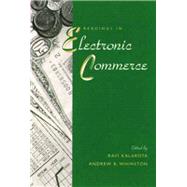
Readings in Electronic Commerce SPHIGS Software
by Kalakota, Ravi; Whinston, Andrew B.Rent Book
New Book
We're Sorry
Sold Out
Used Book
We're Sorry
Sold Out
eBook
We're Sorry
Not Available
How Marketplace Works:
- This item is offered by an independent seller and not shipped from our warehouse
- Item details like edition and cover design may differ from our description; see seller's comments before ordering.
- Sellers much confirm and ship within two business days; otherwise, the order will be cancelled and refunded.
- Marketplace purchases cannot be returned to eCampus.com. Contact the seller directly for inquiries; if no response within two days, contact customer service.
- Additional shipping costs apply to Marketplace purchases. Review shipping costs at checkout.
Summary
Author Biography
Dr. Ravi Kalakota is a pioneer in the area of e-commerce. He is the CEO of e-Business Strategies, a technology research and consulting practice, and has consulted extensively with start-ups and Fortune 1000 companies.
Andrew B. Whinston is the Cullen Chair Professor of Information Systems, Computer Science and Economics, IC2 Fellow, and Director of the Center for Information Systems Management at the University of Texas at Austin. His recent research interests are Internet pricing and application of client/server computing to support groups working collaboratively.
0201880601AB04022003
Table of Contents
| Preface | |
| Acknowledgments | |
| List of Contributors | |
| Biographical Sketches of the Authors | |
| Introductory Overview | |
| An Unaffiliated View of Internet Commerce | |
| Commercial Scenarios for the Web: Opportunities and Challenges | |
| An Evaluation of the World Wide Web as a Platform for Electronic Commerce | |
| General Business and Policy | |
| Electronic Commerce: A Washington Perspective | |
| International Encryption Policy | |
| The Essential Role of Trusted Third Parties in Electronic Commerce | |
| Pricing and Electronic Transactions | |
| Perils and Pitfalls of Practical Internet Commerce: The Lessons of First Virtual's First Year | |
| Economic Issues in Electronic Commerce | |
| A Flexible Framework for Network Payment | |
| Doument Management and Digital Libraries | |
| Document Management and Electronic Commerce | |
| Smart Catalogs and Virtual Catalogs | |
| Business Applications | |
| Distributed Decision Support Systems for Real-Time Supply Chain Management Using Agent Technologies | |
| Electronic Markets | |
| Intranets: Looking beyond Internal Corporate Web Servers | |
| Electronic Publishing versus Publishing Electronically | |
| Index. 0201880601T04062001 | |
| Table of Contents provided by Publisher. All Rights Reserved. |
Excerpts
An electronic version of this book is available through VitalSource.
This book is viewable on PC, Mac, iPhone, iPad, iPod Touch, and most smartphones.
By purchasing, you will be able to view this book online, as well as download it, for the chosen number of days.
Digital License
You are licensing a digital product for a set duration. Durations are set forth in the product description, with "Lifetime" typically meaning five (5) years of online access and permanent download to a supported device. All licenses are non-transferable.
More details can be found here.
A downloadable version of this book is available through the eCampus Reader or compatible Adobe readers.
Applications are available on iOS, Android, PC, Mac, and Windows Mobile platforms.
Please view the compatibility matrix prior to purchase.
